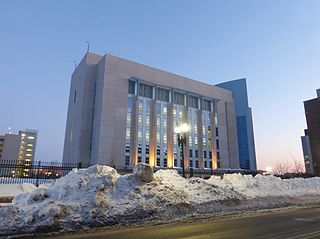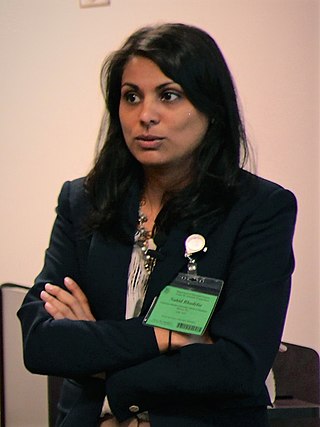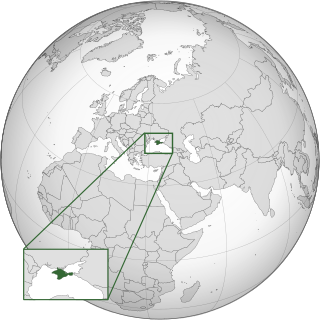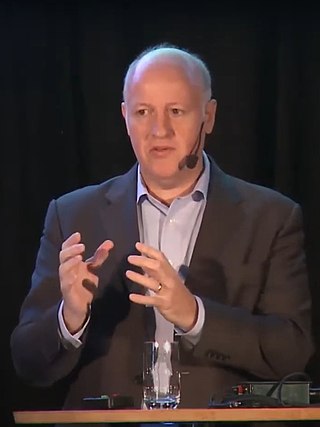EcoHealth Alliance (EHA) is a US-based non-governmental organization with a stated mission of protecting people, animals, and the environment from emerging infectious diseases. The nonprofit organization focuses on research aimed at preventing pandemics and promoting conservation in hotspot regions worldwide.

The National Emerging Infectious Diseases Laboratories (NEIDL) is a biosciences facility of Boston University located in the clinical and biopharma hub of the South End neighborhood of Boston, Massachusetts.
John Brownstein is a Canadian epidemiologist and Professor of Medicine at the Harvard Medical School as well as the Chief Innovation Officer at Boston Children’s Hospital. His research focuses on development of computational methods in epidemiology for applications to public health also known as computational epidemiology or e-epidemiology He is also the founder of several global public health surveillance systems including HealthMap. He is most known for his work on global tracking of disease outbreaks.
The COVID-19 pandemic in San Marino was a part of the ongoing worldwide pandemic of coronavirus disease 2019 caused by severe acute respiratory syndrome coronavirus 2. The virus was confirmed to have reached San Marino in February 2020.

Syra Madad is an American pathogen preparedness expert and infectious disease epidemiologist. Madad is the Senior Director of the System-wide Special Pathogens Program at NYC Health + Hospitals where she is part of the executive leadership team which oversees New York City's response to the Coronavirus disease 2019 pandemic in the city's 11 public hospitals. She was featured in the Netflix documentary series Pandemic: How to Prevent an Outbreak and the Discovery Channel documentary The Vaccine: Conquering COVID.
The Wuhan Jinyintan Hospital is a public hospital located on Jinyintan Avenue in the Jiangjunlu Subdistrict, in the Dongxihu District of Wuhan, Hubei, China, and a unit directly under the Wuhan Municipal Health and Health Committee. Jinyintan Hospital specialises in infectious diseases. Jinyintan Hospital is one of the designated hospitals for emergency medical treatment in Hubei, including Wuhan. The hospital's president is Dr. Zhang Dingyu, a respiratory specialist. Its vice-director is Dr. Huang Chaolin.
The COVID-19 pandemic in Martinique was a part of the ongoing global viral pandemic of coronavirus disease 2019 (COVID-19), which was confirmed to have reached the French overseas department and region of Martinique on 5 March 2020.
The COVID-19 pandemic was confirmed to have reached Åland, an autonomous region of Finland, in March 2020.
Marylyn Martina Addo is a German infectiologist who is a Professor and the German Center for Infection Research (DZIF) Head of Infectious Disease at the University Medical Center Hamburg-Eppendorf. Addo has developed and tested vaccinations that protect people from Ebola virus disease and the MERS coronavirus EMC/2012. She is currently developing a viral vector based COVID-19 vaccine.

Nahid Bhadelia is an American infectious-diseases physician, founding director of the Center on Emerging Infectious Diseases (CEID) at Boston University, and an associate professor at the Boston University School of Medicine. She served as the Senior Policy Advisor for Global COVID-19 Response on the White House COVID-19 Response Team.

Caitlin M. Rivers is an American epidemiologist who as Senior Scholar at the Johns Hopkins Center for Health Security and assistant professor at the Johns Hopkins Bloomberg School of Public Health, specializing on improving epidemic preparedness. Rivers is currently working on the American response to the COVID-19 pandemic with a focus on the incorporation of infectious disease modeling and forecasting into public health decision making.
Alexandra Louise Phelan is an associate professor at Johns Hopkins Bloomberg School of Public Health and senior scholar at the Johns Hopkins Center for Health Security. She specializes in international legal and policy issues that are related to emerging and reemerging infectious diseases, including upstream drivers of disease emergence like climate change.

The COVID-19 pandemic was confirmed to have reached the Ukrainian territory of Crimea in March 2020. The Russian government includes cases in the Republic of Crimea in the count of cases in Russia.
The COVID-19 pandemic was confirmed to have reached Sevastopol in March 2020. The Russian government includes the cases in Sevastopol in the count of cases in Russia.

Peter Daszak is a British zoologist, consultant and public expert on disease ecology, in particular on zoonosis. He is the president of EcoHealth Alliance, a nonprofit non-governmental organization that supports various programs on global health and pandemic prevention. He is also a member of the Center for Infection and Immunity at the Columbia University Mailman School of Public Health. He lives in Suffern, New York.

This article documents the chronology and epidemiology of SARS-CoV-2 in 2019, the virus that causes coronavirus disease 2019 (COVID-19) and is responsible for the COVID-19 pandemic. The first human cases of COVID-19 known to have been identified were in Wuhan, Hubei, China, in December 2019. It marked the beginning of the 2019–2020 COVID-19 outbreak in mainland China.

The COVID-19 pandemic in the Kurdistan Region is part of the ongoing worldwide pandemic of coronavirus disease 2019 caused by severe acute respiratory syndrome coronavirus 2. The COVID-19 disease was first confirmed to have reached the Kurdistan Region, an autonomous region of Iraq, on 1 March 2020.
The COVID-19 pandemic in the Federated States of Micronesia is part of the ongoing worldwide pandemic of coronavirus disease 2019 caused by severe acute respiratory syndrome coronavirus 2. The virus has reached the Federated States of Micronesia on 8 January 2021.

The COVID-19 pandemic in the British Indian Ocean Territory is part of the ongoing worldwide pandemic of coronavirus disease 2019 caused by severe acute respiratory syndrome coronavirus 2. The virus was confirmed to have reached Diego Garcia of the British Indian Ocean Territory in November 2020.
The COVID-19 pandemic in Svalbard is part of the worldwide pandemic of coronavirus disease 2019 caused by severe acute respiratory syndrome coronavirus 2. The virus was confirmed to have reached Svalbard on 6 October 2021.










